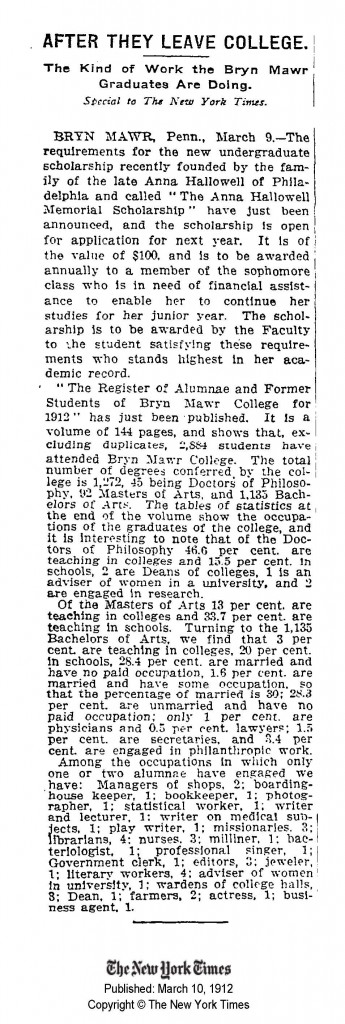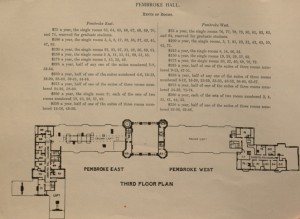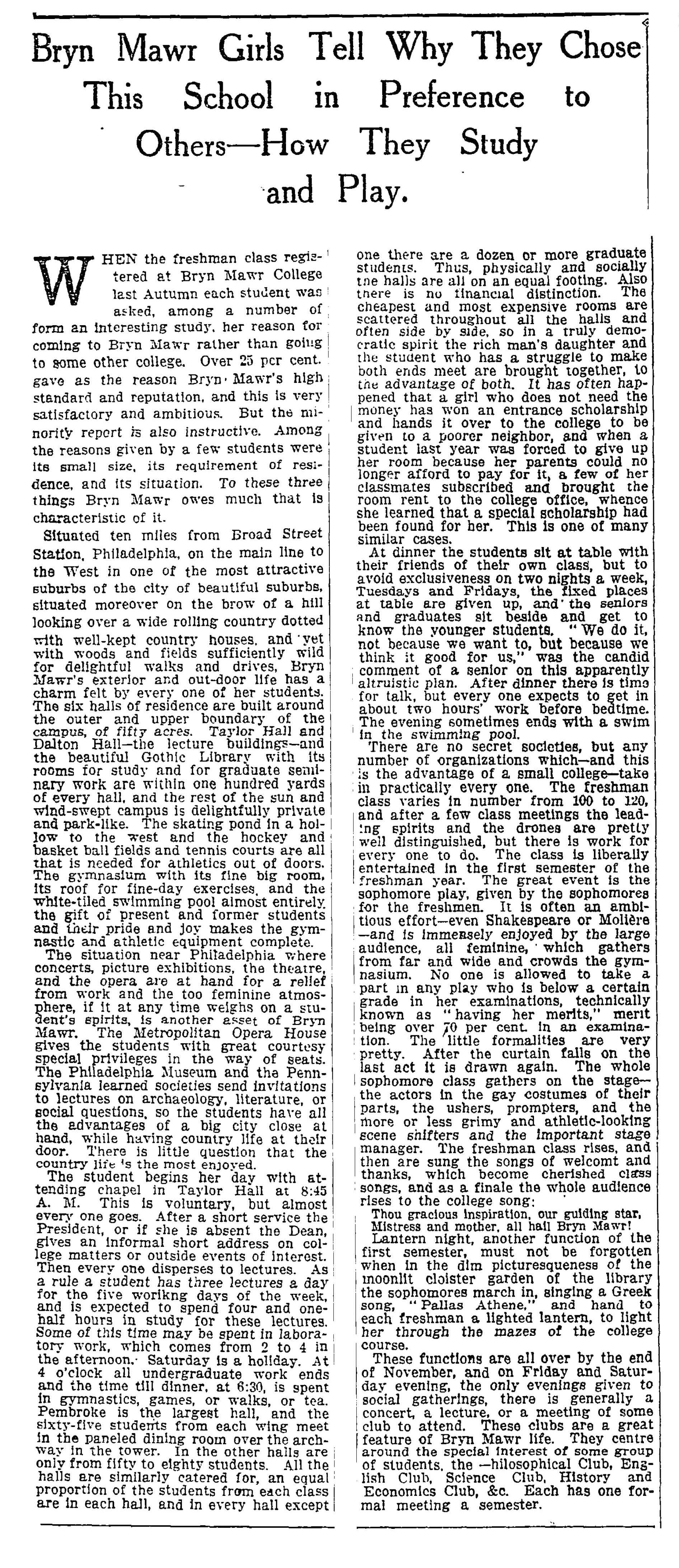A quick post today to share a neat archival specimen found by College Communications intern Ivy Gray-Klein (Bryn Mawr Banter Blogger and champion of the College instagram). Ivy sent this New York Times archived article from March 10, 1912 our way: “Bryn Mawr Girls Tell Why They Chose This School in Preference to Others–How They Study and Play.” The article is a snapshot of Bryn Mawr life just over a hundred years ago. Some things are different, of course, but many remain the same.

An image of the full text is posted at the bottom of this page. The column appears to be only the beginning of a longer piece, the rest of which is not included. Click on any of the images in the post to view and/or download the PDF from the New York Times.
The writer begins with a review of the campus’s picturesque suburban location, noting especially its proximity to the vast cultural offerings of Philadelphia. The “concerts, picture exhibitions, the theater, and the opera” to be experienced there apparently provided the 1912 Mawrtyr with a welcome “relief from work and the too feminine atmosphere,” which at times could “weigh on a student’s spirits.” Though the potential of temporary escape from such a stifling estrogen-drenched environment was an “asset to Bryn Mawr,” the greatest gift of the school’s location was that it provided access to both, whether or not the students made equal use of the two: “the students have all the advantages of a big city close at hand, while having country life at their door. There is little question that the country life is the most enjoyed.”
Bryn Mawr’s dormitories have also always housed a diverse mixture of students. Unlike many institutions at which the residences correspond to the student’s class, the residence halls at Bryn Mawr were each a cross-section of the school, containing women of different ages and degree paths who commingled in the dorms. The article describes their efforts to practice social breadth at mealtimes:
At dinner the students sit at table with their friends of their own class, but to avoid exclusiveness on two nights a week, Tuesdays and Fridays, the fixed places at table are given up, and the seniors and graduates sit beside and get to know the younger students. “We do it, not because we want to, but because we think it good for us,” was the candid comment of a senior on this apparently altruistic plan.
Economic diversity has also been a long-standing feature of the residence halls. “There is no financial distinction,” reads the Times. “The cheapest and most expensive rooms are scattered throughout all the halls and often side by side, so in a truly democratic spirit the rich man’s daughter and the student who has a struggle to make both ends meet are brought together, to the advantage of both.” This was thought of as unusually progressive and sensitive to class privilege at the time, but we explored the flip-side of this arrangement in the digital exhibit Residing in the Past: Space, Identity, and Dorm Culture at Bryn Mawr College. Though it was a forward-thinking practice to deliberately interweave rooms of different prices, the public nature of the floor plans resulted in a high degree of exposure of social class for students who could not afford the more expensive rooms.
The Times‘s description of the 1912 Mawrtyr’s daily routine reveals some changes (“the student begins her day with attending chapel in Taylor Hall at 8:45 A. M.”) and some things that have remained very much the same (“After dinner there is time for talk, but every one expects to get in about two hours’ work before bedtime”). In the coverage of various College rituals, several familiar songs make an appearance, one annual tradition remains more or less identical in description, and one has disappeared altogether. Check out the full text of the article to find out which!
 Additional note: a search of the Times archive from March 10, 1912, reveals that the paper seems to have published a second article about the College on that day, shown at left: “After They Leave College: The Kind of Work the Bryn Mawr Graduates are Doing.” Click the article to view a higher resolution image. Though only a clipping is available online, it reveals some interesting statistics about the lives of the early generations–what percentages married, what percentages went into academia, and how many became milliners, are all revealed by the enticing clip. If anybody has a full copy of the Times from March 10, 1912, please do try to find the rest and let us know!
Additional note: a search of the Times archive from March 10, 1912, reveals that the paper seems to have published a second article about the College on that day, shown at left: “After They Leave College: The Kind of Work the Bryn Mawr Graduates are Doing.” Click the article to view a higher resolution image. Though only a clipping is available online, it reveals some interesting statistics about the lives of the early generations–what percentages married, what percentages went into academia, and how many became milliners, are all revealed by the enticing clip. If anybody has a full copy of the Times from March 10, 1912, please do try to find the rest and let us know!
For more historical tid-bits and reflections on the history of women’s education, follow us on Twitter @GreenfieldHWE.

